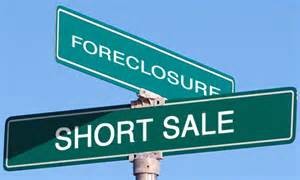There are still plenty of short sales and foreclosed homes on the market, despite the housing market being largely recovered. While the bank is involved in both short sales and foreclosure, it’s important to know that these two terms are very different– and result in a far different buying process! Here’s how these distressed properties work:
Image via Creditfirm.net
A home is a short sale when the seller owes more on the home than it’s worth. These homes might hit the market because the seller is struggling to make payments (sometimes they’re even behind on payments and the bank is considering foreclosure), or simply because the seller must move (for a job or other reason) and the home is not worth what they still owe. Unfortunately, short sales became very common during the recession! The term is derived from the seller coming up “short” in paying back the bank once the home sells. As a result, the bank is heavily involved during the transaction, even though you’re still buying from the home from the owner. The process can be a tedious one for both buyer and seller, and short sales typically take far longer than a standard real estate transaction. When you’re shopping for a home and it is a short sale, be sure to ask your EveryHome agent to let you know how far along it is in the bank approval process, as this can give you a better sense of an expected timeline. Since every short sale is quite different, ask your agent for details.
Foreclosures, on the other hand, tend to be a bit more simplified. A foreclosure occurs when the owner stopped making payments and the bank takes them to court to remove them, or the seller simply hands over the keys in a “deed in lieu of foreclosure.” Either way, the bank becomes the sole owner of the home, and the transaction proceeds accordingly. Generally speaking, banks are motivated to sell homes quickly and the process tends to be easier (and faster!) than a short sale. Foreclosures are nearly always sold “as-is,” as the bank is not willing or able to make repairs and the buyer is responsible for a few more upfront fees, including the transfer tax that is typically paid by the seller.
Questions about a home that is bank-owned? Give us a call at (215)-699-5555!

